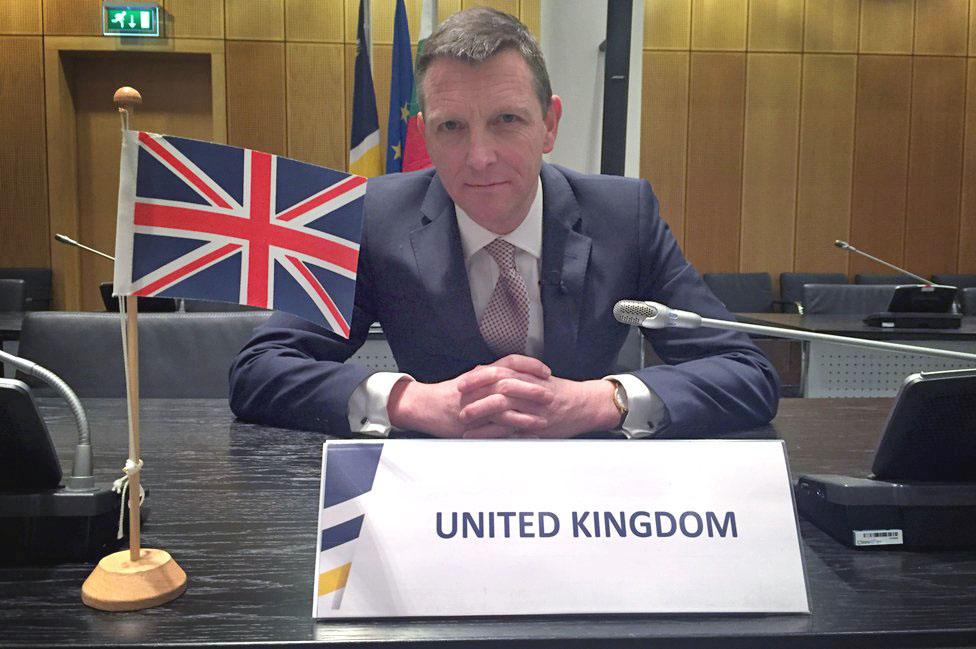Europol head fears loss of UK influence after Brexit
- Published

What might happen to cross-border policing and security once the UK leaves the EU?
Britain will lose influence on cross-border policing and security after Brexit, the outgoing head of Europol has told the BBC.
Rob Wainwright steps down in April, after nine years, as talks begin on what happens once the British flag leaves the Europol boardroom table.
"There will be a loss of influence, there's no doubt about that," said Mr Wainwright.
"The seat at the table will either be fully gone or half gone," he said.
"And that means there will be a loss of British influence, and I think it's a shame for the UK.
"I think it's actually a shame for our European partners as well."

Briton Rob Wainwright (right) has led Europol for nine years
Mr Wainwright, who was recently revealed to have been an MI5 agent before moving to Europol in 2009, reflects the strong British involvement in shaping the priorities and protocols of cross-border police co-operation and law enforcement in the EU.
The UK is the second largest contributor to Europol information systems and is copied in to 40% of the institution's data messages.
Britain also currently leads the Europol teams on issues such as human trafficking and slavery, cigarette smuggling and cybercrime.
"You can see the British DNA of policing in the way this institution works and many other parts of cross-border police co-operation," Mr Wainwright said.
"Every day there is a police operation here, affecting Britain in a positive way, that Europol is helping with and the essence of that I think will continue - but of course it depends on getting the right deal."
Brexit, he said, presented real challenges for the UK's leading role in cross-border security.
"We will find other ways of influencing, more informal ways, but they will be less direct, less pronounced and probably less successful than they are now," he said.
'Uncharted territory'
His warnings come as the UK prepares to begin negotiations on its post-Brexit relationship with the EU on security, law enforcement and criminal justice.
The Policing Minister Nick Hurd wants the deal to be "as close to the status quo as possible".
While Mr Wainwright was entitled to his view, Mr Hurd said, he could not know about loss of influence because the negotiations had not yet begun.
"Part of the reason why Europol works is because of the British contribution," Mr Hurd said.
"We are the second biggest contributor to Europol. Why disentangle that?"
"Why go backwards on that? That's our argument and so far the mood music from our European partners is positive."

Policing Minister Nick Hurd hopes the position post-Brexit will be close to the status quo
UK negotiators are seeking a "holistic and strategic treaty" that would cover access to a range of EU-run policing systems, including access to intelligence databases and the European Arrest Warrant.
The EAW presents a specific challenge because agreements on arresting suspects in other EU countries are underpinned by the European Court of Justice.
The UK government has said leaving ECJ jurisdiction is a "red line" in negotiations.
"There would clearly need to be some measure in place for dispute resolution but that would not be the direct jurisdiction of the European Court," Home Office Europe director Shona Riach has said.
It has been suggested that "political dispute mechanisms and joint committees" might replace the ECJ, although how such a new bureaucracy would work with 27 EU countries is not clear.
Access to European databases such as the Schengen Information System (SIS II) will also require what UK negotiators describe as an ambitious agreement in uncharted territory.
SIS II is a vast and dynamic database of people and vehicle movement across the EU and Schengen area.
In 2015 there were more than three billion SIS searches by police and law enforcement officials, and that number is thought to have doubled in recent times.
Less safe?
Officers at the UK's National Crime Agency access EU databases every day and fear moving from "member status" to "operational status" will make it harder to keep British citizens safe.
"At the minute we have got a really good relationship with EU partners, everyone works on the same platforms, everyone works to the same rules," head of the NCA's International Crime Bureau Matthew Burton said.
"Any lessening of the relationship [that] would affect operational impact and responsiveness and our ability to protect the public would be the concern."
Nick Hurd said: "I think we go into these negotiations with a high level of optimism, simply because the levels of mutual interest are so high."
But even he described the two-year timetable to achieve an agreement as "challenging".
At the point of Brexit, Britain's seat on the EU's European Data Protection Board - which sets the rules for accessing and using Europol and other EU data systems - will disappear.
Without representation, the UK's Information Commissioner, Elizabeth Denham, worries about loss of influence.
"We won't be part of the decision-making about information that is shared and used across Europe, so how that data is shared and used will be determined by the EU Data Protection Board," Ms Denham said.
"We won't have a say on those cross-border cases."
Contingency plans
Mr Hurd pointed out that, at the point of Brexit, the UK would be completely aligned with EU data protection rules. But what happens after that?
"What happens from that point on is subject to negotiation and the kind of reassurances that our European partners will seek," Mr Hurd said.
Contingency plans are being drawn up in case continued access to information and co-operation agreements cannot be agreed before Brexit day.

UK Information Commissioner Elizabeth Denham will lose her seat on the EU Data Protection Board
A Home Office paper on the issue says: "Consideration would need to be given to ensuring that any ongoing investigations would not be affected in such a way that criminals might escape prosecution or vulnerable individuals might be rendered less safe."
The shared threat from terrorism and cross-border crime means it is likely a key player like the UK will be able to negotiate some sort of special deal with the EU after Brexit - but it will be hard for British law enforcement officials to maintain their agility and their influence over European security systems.
- Published20 September 2017

- Published30 March 2017

- Published24 March 2016
